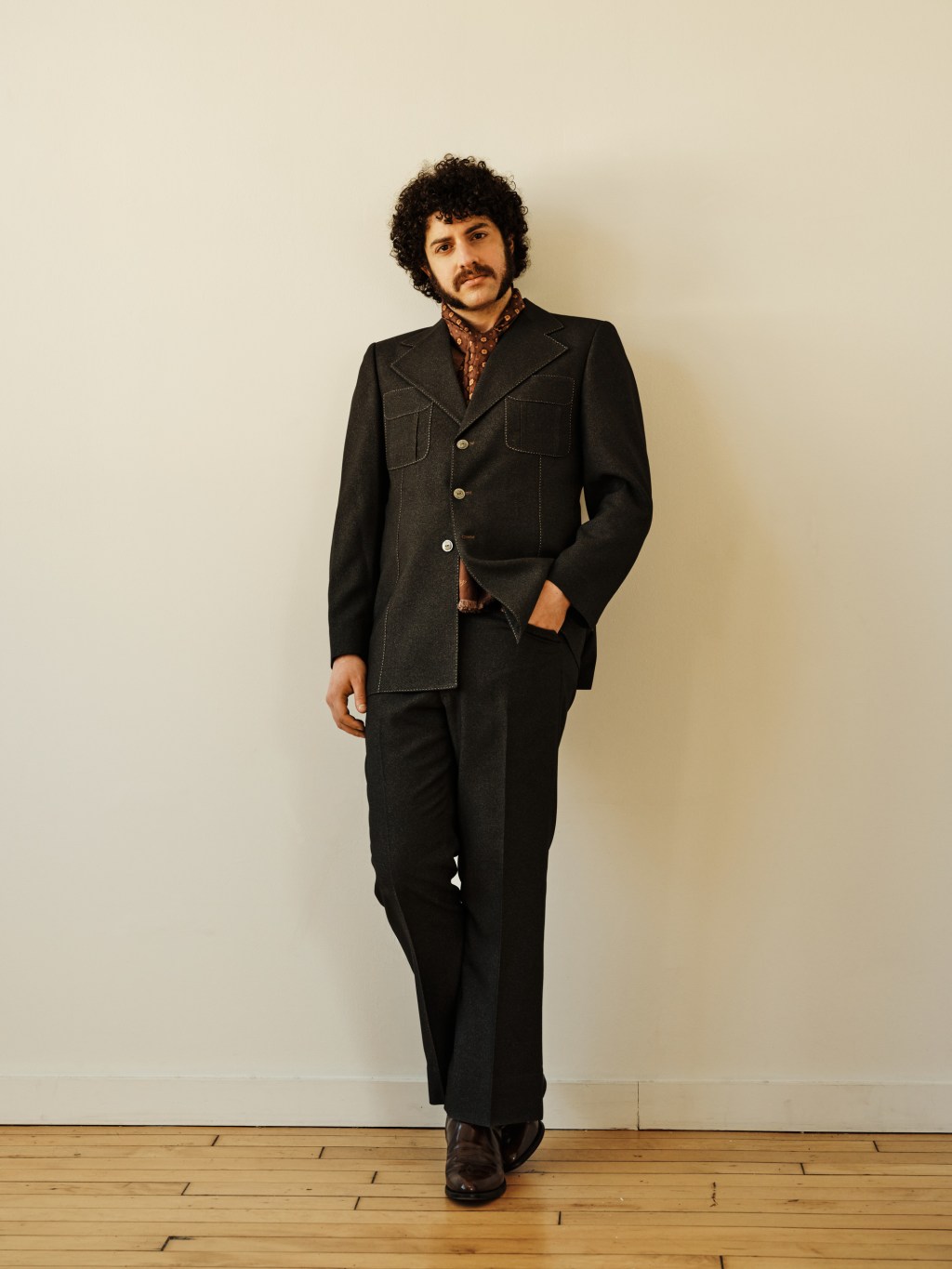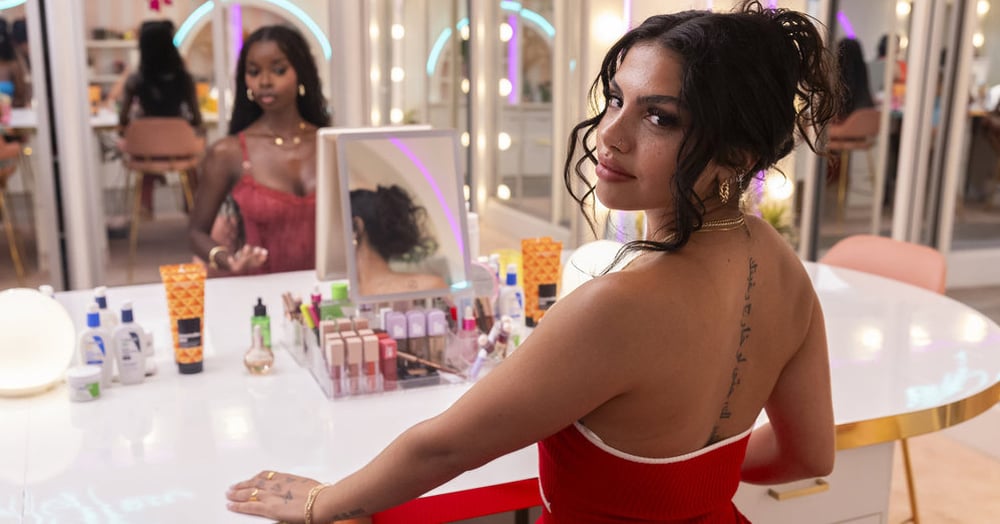The day before the world shut down for the COVID-19 pandemic, Eli Gelb auditioned for a production of “Stereophonic.” Now, four years later, he’s making his Broadway debut in the show at the Golden Theater.
“Stereophonic” follows a fictional Fleetwood Mac-esque band and two sound engineers over the course of a year as they struggle to make an album, manage toxic relationships, navigate the drug-filled ’70s rock world and ultimately, grow up. Gelb plays the lovable stoner sound engineer Grover, who perhaps grows the most over the year. Gelb says he fell in love with the 220-something page script right away.
“I had a couple of days to read it and prepare,” he recalls of his 2020 audition. “I sort of had to skim it and I was like, ‘I think I love this thing.’”
While life was put on pause, Gelb couldn’t help but return to the script, mulling over the story and the many parallels it posed during the pandemic.
“I couldn’t stop thinking about the play,” he says. “All the themes of isolation and togetherness and needing each other, tearing each other apart, those dichotomies were resonating really hard.”
It’s these themes that he thinks are leaving audiences awestruck after the three-hour show each night. Throughout the pandemic, Gelb stayed in close touch with the director, ultimately leading to him snagging the role on Broadway.
While Gelb’s character lied about his previous experience in engineering for the Eagles to get the job, viewers will quickly forgive him, as he acts as the audience surrogate. Throughout the play, he listens in on private conversations and gossips (a bit of gossip is professional, according to Grover) to fill viewers in on what’s going on outside of the studio.
Gelb’s castmates have the challenge of playing instruments and singing live each night — the show features original music by Arcade Fire’s Will Butler — but he is tasked with an equal obstacle: acting with his back to the audience for a good chunk of the show, as he sits at the soundboard facing the band. He’s taken it in stride.
“I’ve talked to a lot of people who were like, ‘Oh, it’s so interesting how I can tell how you’re feeling just looking at your back, and I’m really happy to hear that,” Gelb says. “I’m responding the same way that I would if you were looking at my face… I do try to think about punctuating moments with clarity of movement.”
Although Gelb’s character acts as the voice of reason in several moments throughout the play, particularly as the band struggles with professionalism while managing interpersonal relationships, he also has these “punctuating moments” of comedy and turmoil.
“Grover’s freaking out inside for a variety of reasons,” he says, including lying about his previous experience. “The dichotomy of that confidence and that terror, it’s an interesting balance.”
Gelb may not be a trained sound engineer, but his passion for music shines through Grover.
“In some ways, the fact that it’s an artistic medium that [I don’t] have much skill in made it easier to be like, ‘Oh, let me just escape into this thing that I love,’” he says, adding that his two former roommates were musicians and influenced his avid listening.
“Stereophonic” is hitting Broadway at a time when viewers are more obsessed with musicians — past, present and fictional — than ever. The world has its eyes on Taylor Swift. Fleetwood Mac’s live performance of “Silver Springs,” where Stevie Nicks and Lindsey Buckingham seemingly hashed out their breakup on stage, has gone viral several times over. The television show “Daisy Jones & the Six,” another fictionalized story of a band grappling with relationships, drugs and music, captivated audiences last year. “Stereophonic” is no different, and Gelb has some ideas as to why people resonate with this story so much.
“There’s something pure about a time that’s not your own,” he says, adding that people love a bit of nostalgia.

He does too, and has embraced the ’70s both onstage and offstage – growing a mustache and mutton chops; listening to The Beach Boys, Todd Rundgren and Black Sabbath, and sporting styles of the era for the last year.
“I didn’t want to look in the mirror and be like, ‘Who the f*** is that guy?’ I didn’t want it to feel like a novelty,” he says. “When I was in costume, I wanted to feel like that’s me.”
Given the time to explore and play around with elements from the era, Gelb says his version of Grover has changed quite a bit since he played the role at off-Broadway Playwrights Horizons.
“When I first started playing him, it was a little bit more goody two shoes… I wanted to give him as much credit as possible as an engineer. I felt like, ‘Well, then he can’t be a stoner,’ but he is,” Gelb says. “That’s part of the thing that I love about the character. When’s the last time you saw a really passionate, devoted to their craft stoner? I feel like that’s what I am as a person, [but]… I didn’t have the courage to go there right away.”
While Gelb’s journey with the show has been a long one — and, of course, was interrupted by a global pandemic — he wouldn’t have it any other way and is eager to give audiences some of the takeaways he’s had.
“It’s been a dream the whole time, ever since I’ve read it,” he says. “Life is complicated and it hurts so much and it’s so beautiful and it’s so lonely and it’s so effervescent and lively… Where the play lands for me, it’s heartbreak and hope and gratitude… Maybe [holding space for two things at once], that’s the ultimate gift of the play, to create a space where that’s encouraged.”



